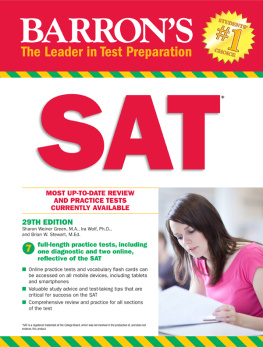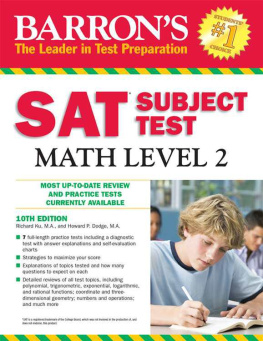Ira K. Wolf - SAT Subject Test Math Level 1: With 5 Practice Tests
Here you can read online Ira K. Wolf - SAT Subject Test Math Level 1: With 5 Practice Tests full text of the book (entire story) in english for free. Download pdf and epub, get meaning, cover and reviews about this ebook. year: 2020, genre: Children. Description of the work, (preface) as well as reviews are available. Best literature library LitArk.com created for fans of good reading and offers a wide selection of genres:
Romance novel
Science fiction
Adventure
Detective
Science
History
Home and family
Prose
Art
Politics
Computer
Non-fiction
Religion
Business
Children
Humor
Choose a favorite category and find really read worthwhile books. Enjoy immersion in the world of imagination, feel the emotions of the characters or learn something new for yourself, make an fascinating discovery.
- Book:SAT Subject Test Math Level 1: With 5 Practice Tests
- Author:
- Genre:
- Year:2020
- Rating:3 / 5
- Favourites:Add to favourites
- Your mark:
- 60
- 1
- 2
- 3
- 4
- 5
SAT Subject Test Math Level 1: With 5 Practice Tests: summary, description and annotation
We offer to read an annotation, description, summary or preface (depends on what the author of the book "SAT Subject Test Math Level 1: With 5 Practice Tests" wrote himself). If you haven't found the necessary information about the book — write in the comments, we will try to find it.
Ira K. Wolf: author's other books
Who wrote SAT Subject Test Math Level 1: With 5 Practice Tests? Find out the surname, the name of the author of the book and a list of all author's works by series.
SAT Subject Test Math Level 1: With 5 Practice Tests — read online for free the complete book (whole text) full work
Below is the text of the book, divided by pages. System saving the place of the last page read, allows you to conveniently read the book "SAT Subject Test Math Level 1: With 5 Practice Tests" online for free, without having to search again every time where you left off. Put a bookmark, and you can go to the page where you finished reading at any time.
Font size:
Interval:
Bookmark:
Ira K. Wolf, Ph.D.
Former High School Math Teacher,
College Professor of Mathematics, and
University Director of Teacher Preparation
SAT is a trademark registered and/or owned by the College Board, which was not involved in the production of, and does not endorse, this product.
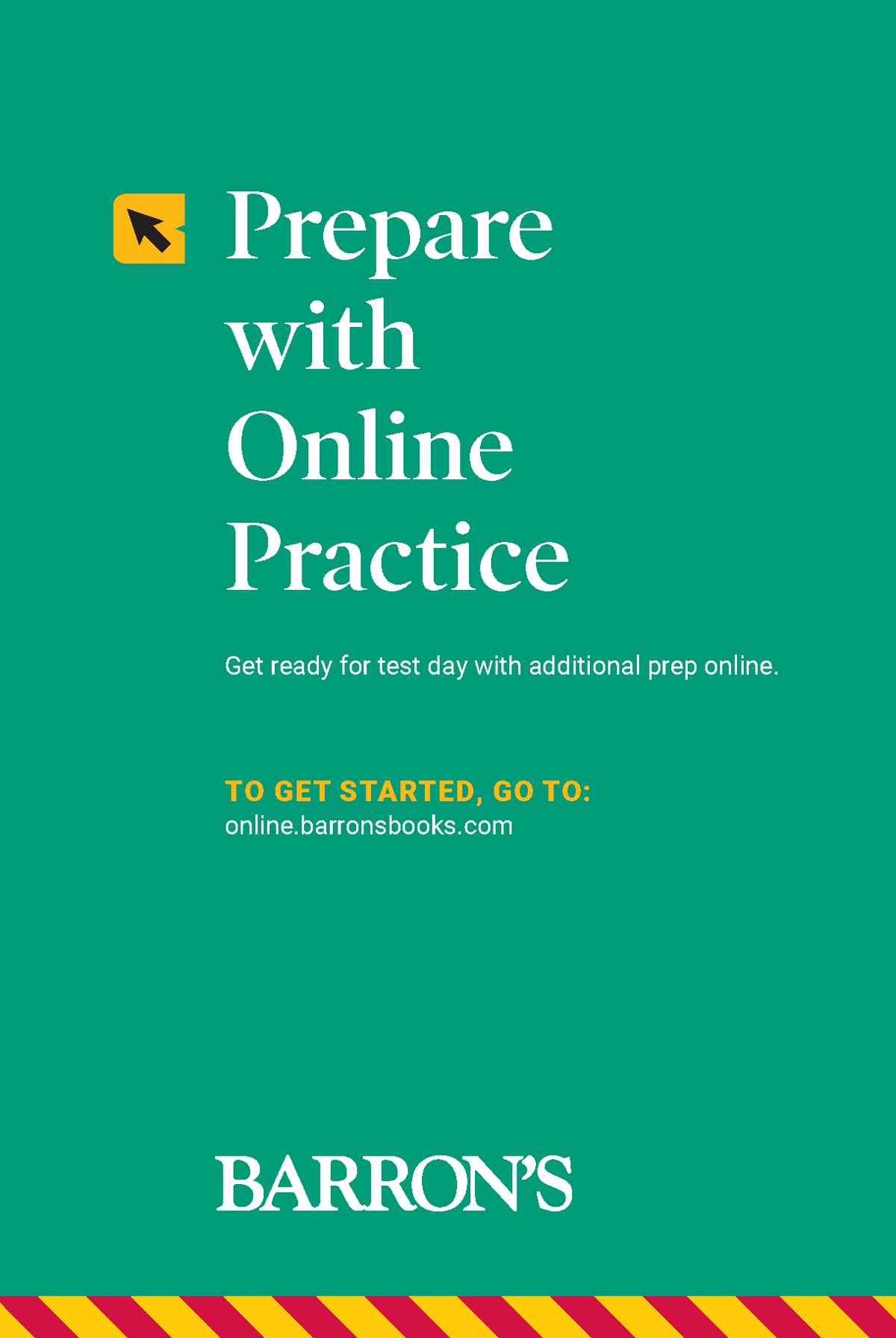
Dr. Ira Wolf has had a long career in math education. Besides teaching math at the high school level for several years, he was a professor of mathematics at Brooklyn College and the Director of the Mathematics Teacher Preparation program at SUNY Stony Brook. In addition, during the past 40 years, Dr. Wolf has helped thousands of students prepare for the PSAT, SAT, and SAT Subject Tests in Math. In addition to being the author of this book, he is the co-author of Barrons SAT, PSAT, and GRE books.
Copyright 2020, 2018, 2016, 2014, 2012, 2010, 2008 by Kaplan, Inc., d/b/a Barrons Educational Series. Previous edition Copyright 2005 by Kaplan, Inc., d/b/a Barrons Educational Series under the title How to Prepare for the SAT II: Math Level 1C.
All rights reserved under International and Pan-American Copyright Conventions. By payment of the required fees, you have been granted the non-exclusive, non-transferable right to access and read the text of this eBook on screen. No part of this text may be reproduced, transmitted, downloaded, decompiled, reverse engineered, or stored in or introduced into any information storage and retrieval system, in any form or by any means, whether electronic or mechanical, now known or hereinafter invented, without the express written permission of the publisher.
Published by Kaplan, Inc., d/b/a Barrons Educational Series
750 Third Avenue
New York, NY 10017
www.barronseduc.com
ISBN: 978-1-5062-6717-3
10 9 8 7 6 5 4 3 2 1
- what are sat subject tests?
- score choice
- how many sat subject tests should you take?
- how are sat subject tests scored?
- how do you register for an sat subject test?
On these first four pages, you will learn the basic facts you need to know about SAT Subject Tests. On , you will learn everything you need to know about the Math Level 1 test in particular.
Each SAT Subject Test is an hour-long multiple-choice exam designed to test your knowledge of one specific course that you studied in high school. The following chart lists all the SAT Subject Tests that the College Board offers.
| Subject | Tests |
| English Social Studies Mathematics Science Foreign Language | Literature World History United States History Math Level 1 Math Level 2 Biology Chemistry Physics French German Hebrew Italian Latin Spanish Chinese Japanese Korean |
The College Board has a Score Choice policy for all SAT Subject Tests, as well as for the SAT. What this means is that at any point in your high school career you can take (or even retake) any Subject Tests you want, receive your scores, and then choose whether or not the colleges to which you eventually apply will ever see those scores. In fact, you dont have to make that choice until your senior year when you are actually sending in your college applications. Suppose, for example, that you take the Biology test one year and the Chemistry test the following year. If you earn very good scores on both exams, then, of course, you can send the colleges both scores; if, however, your Chemistry score is much better than your Biology score, you can send the colleges only your Chemistry score and the colleges wont even know that you took the Biology test. Similarly, if you take the Math Level 1 test in June and retake it in November, you can send the colleges just your higher score.
Not every college and university requires you to submit SAT Subject Test scores as part of the admissions process. So, if you knew with certainty that you were applying only to schools that do not require their applicants to take Subject Tests, you would not have to take any.
However, when you are in ninth, tenth, or even eleventh grade, it is impossible for you to know exactly which schools you will be applying to in the fall of your senior year. Also, colleges and universities that dont currently insist that applicants submit scores from SAT Subject Tests may change their policy. In the past few years, many colleges that previously had not required applicants to take Subject Tests have begun requiring them. Therefore, most studentsand certainly all good studentsshould plan on taking some Subject Tests.
Another reason for taking SAT Subject Tests is that even colleges that do not require them for admissions may use them for placement purposes. Often, if you have a good score on a Subject Test, you may be exempted from taking an introductory course in that area and be able to take a more interesting elective.
Finally, remember that because of Score Choice, you are at no risk. If you take a Subject Test and dont get a score you are happy with, you never have to submit it.
All colleges that require applicants to submit scores from SAT Subject Tests ask for two. Consequently, most students, and certainly all very good students, should plan to take at least two Subject Tests. You should know, however, that many students take more than two, some as many as five or six. They do this because the Score Choice policy allows them to send whichever scores they like so they can pick their best two scores from among all the tests they have taken. Or, if they have really good scores on more than two tests, they can try to really impress the admissions officers by submitting scores from four, or five, or even more tests. A good guideline is that you should take an SAT Subject Test in any subject in which you feel you can earn a high score. On any test date, you may take one, two, or three Subject Tests, but you may not take any in the month you take the SAT.
Most SAT Subject Tests are given six times per year: in May, June, August, October, November, and December. By far the most common month in which to take a Subject Test is June, at the end of the year in which you study the subject on that test. For example, you certainly should not take a history or science Subject Test in December of the year you are taking the courseat that point you will have covered less than half the years work. Also, taking one of those tests in the fall after your course is over makes no sense when you have not looked at the subject for several months. The major exception to this rule is the Math Level 1 test, which you can take any time after you have completed three years of high school math. Some students take their first year of high school algebra in middle school, when they are in eighth grade. Those students will have completed their three-year math sequence at the end of tenth grade and could take the Math Level 1 test at that time.
Two types of scores are associated with SAT Subject Tests: raw scores and scaled scores. Your raw score is calculated by giving you 1 point for a correct answer, deducting 
Font size:
Interval:
Bookmark:
Similar books «SAT Subject Test Math Level 1: With 5 Practice Tests»
Look at similar books to SAT Subject Test Math Level 1: With 5 Practice Tests. We have selected literature similar in name and meaning in the hope of providing readers with more options to find new, interesting, not yet read works.
Discussion, reviews of the book SAT Subject Test Math Level 1: With 5 Practice Tests and just readers' own opinions. Leave your comments, write what you think about the work, its meaning or the main characters. Specify what exactly you liked and what you didn't like, and why you think so.

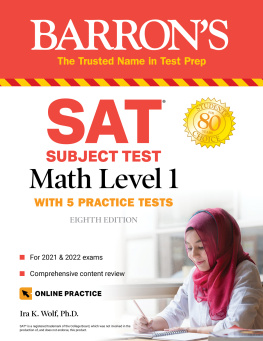
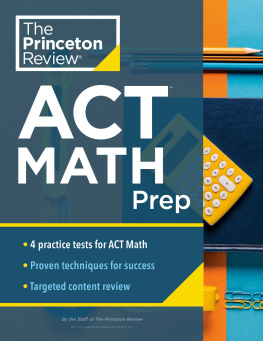

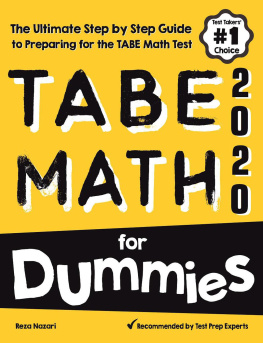
![Kristina Semos - Math 2 Cram Plan [SAT 2 Math Test Prep]: The Ivy Lounge Test Prep Guide to High-Speed, High-Impact Prep for the SAT II Subject Test in Math Level 2](/uploads/posts/book/162872/thumbs/kristina-semos-math-2-cram-plan-sat-2-math-test.jpg)
